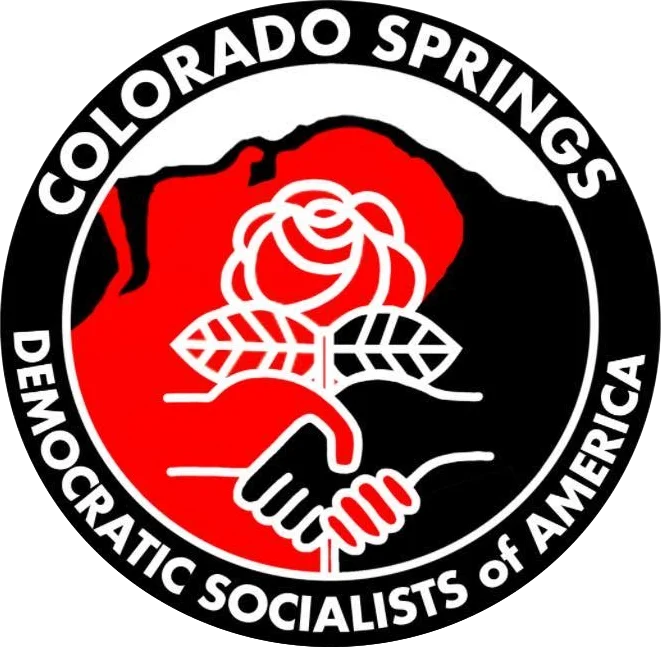

Still No Appetite For Apartheid!

 This January, Salt Lake DSA renewed its participation in the national boycott campaign of Israeli and Zionist foods called No Appetite for Apartheid, launched by the Palestine Solidarity Working Group in 2022, which is itself part of the Apartheid Free Zones campaign and the larger BDS movement launched by Palestinian civil society groups in 2005. We are canvassing local stores to see if we here in Utah can help add to the number of Apartheid Free stores nationwide, which will support the struggle for the liberation of Palestine. See the chapter calendar for biweekly meetings and canvassing update, follow the guidelines in the one-pager below, and join us!
This January, Salt Lake DSA renewed its participation in the national boycott campaign of Israeli and Zionist foods called No Appetite for Apartheid, launched by the Palestine Solidarity Working Group in 2022, which is itself part of the Apartheid Free Zones campaign and the larger BDS movement launched by Palestinian civil society groups in 2005. We are canvassing local stores to see if we here in Utah can help add to the number of Apartheid Free stores nationwide, which will support the struggle for the liberation of Palestine. See the chapter calendar for biweekly meetings and canvassing update, follow the guidelines in the one-pager below, and join us!

The post Still No Appetite For Apartheid! first appeared on Salt Lake DSA.

Fragile Juggernaut: The Story of the CIO


Statement Regarding Aaron Bushnell
On Sunday February 25, fellow peace activist and active-duty member of the US Air Force Aaron Bushnell self-immolated outside the Israeli Embassy in Washington, DC. His last words echo in our ears: “I am about to engage in an extreme act of protest, but compared to what the people have been experiencing in Palestine at the hands of their colonizers, it is not extreme at all. This is what our ruling class has decided will be normal. Free Palestine! Free Palestine! Free Palestine!” He also stated that he would “no longer be complicit in genocide.”
Colorado Springs DSA recognizes Aaron’s sacrifice and the deeply empathetic pain that precipitated it. Aaron clearly held foremost in his thoughts the tens of thousands of civilians and children that have been murdered by Israel since October 7th. This death count continues to climb at an alarming rate, facilitated by American funding and weaponry, despite the fact that the majority of Americans – of all religions and ethnicities – support an immediate ceasefire. We hope that Aaron’s sacrifice will wake our elected officials up to the atrocity that most of them have been supporting and continue to support through allowing the United States to continuously veto U.N. ceasefire resolutions, allowing President Biden to bypass congress in sending weapons to Israel that make the genocide possible, and continuing to supply the Israeli apartheid government with billions of dollars in U.S. taxpayer money. We encourage all people of conscience to amplify Aaron’s message of peace and freedom as loudly as possible and call on all elected and unelected actors who are complicit in genocide to cease aiding and abetting the fascist colonial settler state of Israel.
We would also like to push back on the weaponization of psychological vocabulary as a cudgel against any message that is potentially disruptive to colonial and capitalist ideology. Despite the recurring tendency of the ruling class to pathologize people, actions, and ideas that threaten their hegemony, we have every reason to believe that Aaron was steadfastly principled, articulate, and clear-headed in his choice to use his dying act to communicate his message as powerfully as he knew how. He spoke with conviction and integrity, continuing a long history of nonviolent extreme protest in response to extreme circumstances. A genocide is an extreme circumstance, and all principled people who are paying attention can recognize what drove Aaron to martyr himself, even without taking that path themselves. All attempts to dismiss Aaron as “mentally ill” are rooted in a disagreement with his central message: stop the genocide and free the Palestinian people immediately. To be willing to die for others is an act of extreme love, not of insanity. Colorado Springs DSA will keep Aaron in our hearts and draw from his strength and solidarity with the Palestinian people in continuing to call for an immediate permanent ceasefire and a free Palestine.


CVDSA’s Socialist Voter Guide for Town Meeting Day 2024
For City Council…
This election season, Champlain Valley DSA has focused on our two endorsed City Council campaigns: Marek Broderick for Burlington’s Ward 8 and Nick Brownell for Winooski.
As CVDSA members, Marek and Nick have attended countless rallies, pickets, meetings, and canvasses. We know the depth of their commitment to socialist politics and have the utmost confidence that, as elected officials, they will always put workers and tenants first. If either appears on your ballot, please support them.
CVDSA members vote on the chapter’s endorsements based on candidates’ answers to our Electoral Working Group’s questionnaire. We have not endorsed any other candidates for the March election. But that doesn’t mean we’ll be leaving the rest of our ballots blank.
Seven of Burlington’s eight wards host competitive races for City Council. The Vermont Progressive Party, which CVDSA has traditionally supported electorally, has a candidate running in every part of the city (if we include a Prog-endorsed independent in Ward 5). Our own Marek Broderick is one of them.
With the rest, we don’t always see eye-to-eye. This year, several of the candidates’ policy platforms center not merely a strategic retreat from the Progs’ circa-2020 emphasis on the failures and injustices of city policing but, more troublingly, a full about-face, with prominent assertions that public safety demands robustly funded and fully staffed local law enforcement.
In some cases, too, the Progs appear to have capitulated to conservative calls to solve Burlington’s crisis of affordability by slashing property taxes for qualifying homeowners, even as badly needed public services grow more expensive. Broad proposals to sensitize municipal property taxes to income fundamentally represent rejections of the concept of a wealth tax, which leftists tend to favor (and generally wish to expand) in other contexts. All but the very narrowest of such plans would serve to shift the city’s tax burden away from relatively high-wealth retirees – who, in a town where houses don’t come cheap, inevitably comprise the bulk of “low-income” homeowners – and onto working Burlingtonians.
But there are bright spots, as well, among 2024’s batch of Progs, which includes just one incumbent (the redoubtable Gene Bergman). Going against a longtime tendency within the party toward a “small is beautiful” politics, all of them have evinced a commitment to expanding Burlington’s housing stock significantly by allowing denser residential and mixed-use construction. Several of them also have bold, detailed plans for municipal decarbonization.
And the Democrats are worse than ever. For City Council, we recommend Carter Neubieser in Ward 1, Gene Bergman in Ward 2, Joe Kane in Ward 3, Dan Castrigano in Ward 4, Lena Greenberg in Ward 5, Will Anderson in Ward 6, and Lee Morrigan in Ward 7. Most of all, we again urge you to vote for CVDSA’s Marek Broderick in Ward 8.
Winooski, meanwhile, holds nonpartisan elections, but the Progs have endorsed not only Nick Brownell but also incumbent Aurora Hurd for the two open seats on the at-large council. Alongside Nick Brownell, our own enthusiastically endorsed candidate, we recommend Aurora Hurd in Winooski.
For Mayor…
While Winooski doesn’t have a competitive race for mayor (or water commissioner or school trustee, for that matter), the top of Burlington’s ballot, of course, features a four-way contest to replace Democrat Miro Weinberger. Practically, it is a two-person race between State Rep. Emma Mulvaney-Stanak and South District Councilor Joan Shannon.
It’s an easy choice – not because one candidate is very good, but because the other is very, very bad. The post-2020 forces of reaction that have made municipal politics crueler, stupider, and more paranoid in liberal cities across America have found their local culmination in Shannon’s nomination by the Burlington Democrats, who chose her over a relatively moderate Karen Paul, the wealthy South End’s other representative on City Council.
Shannon has spent decades as the right flank of Burlington’s right-wing party. Having avoided the momentary lapse of judgment that led most of her Democratic colleagues to join the Progs in a call for racial justice four years ago, she now stands to benefit. Her coalition of angry homeowners knows that only an increase in state violence and incarceration can wipe away the recent unsightliness in our downtown, and they may soon have their chance.
Hoping to win over Burlington’s political center, Mulvaney-Stanak has taken care not to distinguish herself too dramatically from her opponent. Joan leads by talking about “public safety”; for Emma, the main subject is “community safety.” On other issues, Mulvaney-Stanak’s platform trafficks in assurances that she will “convene stakeholders and experts” to develop appropriate policies, instead of articulating concrete ideas that could be debated seriously.
If Mulvaney-Stanak wins, her defensive posture may persist for the duration of her mayoralty. Still, she is a Prog. She may not have a forward-looking vision of her own for Burlington (let alone a radical one), but if a left-leaning City Council seeks to implement one, she probably won’t veto it. Joan Shannon would.
The stakes are too high for a protest vote, and neither of the two non-competitive independents is a lefty in any case. For Mayor of Burlington, we recommend Emma Mulvaney-Stanak.
Other races and ballot questions…
For Burlington School Commissioner, only Ward 7 features a competitive race. We recommend Monika Ivancic over anti-trans activist William Oetjen.
Ward 7 also has the only competitive race for Inspector of Election. Regrettably, we haven’t learned enough about Linda Belisle or Larry Holt to offer a recommendation. Holt is the incumbent, but Belisle has also served as an inspector in Ward 4.
Ward 8 doesn’t have a candidate for Inspector of Election; we recommend that you write in Jack Sparr. Trust us on this one.
The rest of Burlington’s ballot is conspicuous for what it doesn’t contain. As recently as January, we expected a chance to vote on a new police oversight proposal – a legislatively referred charter change that would have strengthened the city’s existing Police Commission, rather than creating a wholly new disciplinary entity as last year’s somewhat more daring citizens’ initiative sought to do – but City Council decided at the last minute that it wasn’t ready for primetime. In a rare and especially shameful move, the Council also shot down an advisory question that would’ve allowed Burlingtonians to declare their collective opposition to Israeli apartheid, even though residents had gathered more than 1,700 signatures from voters in support of the measure.
Without any popular causes to rally Progressives to the polls, the Democrats may benefit from depressed turnout. We hope voters won’t reward them for their bad behavior.
What remains on the ballot is a trio of articles containing a school budget, a public safety tax rate increase, and a proposal to increase the bonding authority of the Burlington Electric Department.
We recommend a yes on Question 1. Last year, Burlingtonians approved the construction of a new high school, and now it’s time to start paying for it. People may not like it – especially at the very moment when Vermonters have to fill in the gap left by the end of the federal COVID-19 dollars that temporarily propped up our state education fund – but that’s how it works.
We recommend a no on Question 2. Because the police and fire tax pays only for a fraction of our police and fire budgets (with most of the rest coming out of the city’s general fund), a rate increase could, theoretically, serve as a politically expedient way to expand Burlington’s overall resources, since voters already rejected an increase to the general city rate two years ago. In reality, the money will go to Chief Murad’s typically dysfunctional, sometimes barbarous, and (thanks in part to City Council) always unaccountable Burlington Police Department, which already spends more than it ever has before. With a few extra million, they’ll still probably claim to have been defunded when residents call for help.
We recommend a yes on Question 3. We want our municipal electric utility to have access to the capital it needs to make good investments. BED hasn’t yet put forward a plan for any major new projects; a separate nonprofit will issue debt to pay for the controversial “district energy” pipeline from the McNeil plant, irrespective of BED’s bonding authority. In the immediate term, approving this ballot question will serve to improve BED’s credit rating.
Winooski’s ballot questions don’t offer much to get excited (or upset) about, either. Due to procedural missteps by the city, a second vote on Just Cause Eviction, which voters approved last year, still needs to happen before it can progress to the state legislature, but the responsibility for correcting 2023’s administrative error lies in the hands of the same people who committed it in the first place, and apparently, it’ll have to wait.
Starting at the top, 2024’s Winooski articles ask voters to approve the municipal budget, to approve the spending of city revenue derived from sources other than property taxes, to approve the spending of leftover funds from an old water infrastructure bond, to authorize a new $4.6 million bond to help reconstruct the Burlington-Winooski Bridge, and (this time on behalf of the Champlain Water District) to approve the spending of leftover funds from yet another old water infrastructure bond.
In other words, should Winooski residents allow their city government to continue to perform normal governmental functions? We recommend voting yes on all articles in Winooski.
Advocates for pedestrians and cyclists have rightly called the proposed design for the new Burlington-Winooski Bridge outdated and car-centric, and Winooski officials continue to hold out hope that additional contributions from state or federal sources will reduce the city’s prospective share of the project’s final cost. Approving Article 7 won’t foreclose these discussions. Ultimately, the century-old bridge must go.
On a separate ballot, Vermonters can vote in the Democrats’ presidential primary. We’d advise voting symbolically for a left-wing challenger if Biden faced one, but we don’t think Cenk Uygur or the defunct campaign of Marianne Williamson counts. CVDSA offers no recommendation. While Burlingtonians receive municipal ballots automatically by mail, they must request presidential primary ballots online or in person.
Town Meeting Day is March 5. Vermont offers same-day voting registration. Click for information about voting in Burlington or Winooski.


March 5, 2024 Voter Guide
This is the March, 2024 Democratic Primary San Antonio Democratic Socialists of America (SADSA) Voters Guide. There are no SADSA endorsed candidates on the ballot this cycle.
All candidates named in this guide are recommended, however, San Antonio DSA did not actively campaign on their behalf. Candidates and propositions must seek the endorsement of SADSA, as our general membership votes on the decision to endorse. Several community members have reached out to SADSA for a voter guide, so we created one. It is by no means expansive and does not cover every race in our area, but we hope this can help inform your decisions if you’re looking to a socialist organization for electoral advice.
We know during a presidential year, much of the attention focuses on the top of the ticket, but local and state races arguably have just as much impact on our daily lives. None of the presidential candidates nor parties represent the interests of working people. Unfortunately for many state and local voters, neither do the candidates running for those positions. If a candidate is in a solid district, running unopposed,, we opted to not recommend.
Our struggles go beyond the ballot box, but it is a site of struggle that we cannot withdraw from or ignore. We can take it back if we fight together. Join San Antonio DSA.
If you have any questions or comments, please do not email SanAntonioDSA@gmail.com.
You can vote at any voting location in Bexar County. Go to the Bexar Co. Elections Department website to find voting locations, hours, your individual sample ballot, and more.

Becoming More Powerful than the Boss with Claire Valdez
Tonight, we’re talking to Claire Valdez, a NYC-DSA endorsed candidate for Assembly District 37 in Queens about what being endorsed by NYC-DSA and UAW Region 9A means to her, how she plans to bring her union organizing experience of becoming ‘more powerful than the boss’ to the halls of power in Albany and much more.
There are currently 8 socialists endorsed by NYC-DSA serving in Albany in the Senate and Assembly. If electoral organizers get their way- that number could be 11 next year - the largest socialist block ever elected in New York.
NYC-DSA has voted to endorse three new-insurgent candidates this year- Claire in Queens, Eon Huntley in Brooklyn and Jonathan Soto in the Bronx.
As we do every year, we will talk to all of the new-dsa endorsed candidates here on Revolutions Per Minute and tonight is the first in that series of interviews with the NYC-DSA’s 2024 slate. So stick around to hear from Claire, a union organizer running for Assembly District 37 in Queens - stretching from Long Island City, Sunnyside and Maspeth to Ridgewood.
To learn more visit https://claireforqueens.com/ and to sign up for a canvassing shift https://claireforqueens.com/events/

Nitehawk Workers Union


Should the DC left fear ranked choice voting or semi-open primaries?

DSA's National Campaign for Trans Rights & Bodily Autonomy
This past weekend, DSA held their inaugural kickoff for their new nationwide campaign for Trans Rights & Bodily Autonomy. Spearheaded by the Trans Rights and Bodily Autonomy Campaign Commission, DSA will mobilize the organization’s tens of thousands of members across 150+ chapters across the country, not only to combat the advances of the far-right and their systematic attempt at every level of government to remove trans people from public life & restrict access to abortion, but also to advance a positive vision of queer liberation that protects queer spaces, our rights as workers, students & educators, and as human beings. Tonight, we will hear from Genevieve, joining us from Ithaca, NY and one of the leaders of this organization-wide project, to break down all the pieces of this ambitious campaign, how DSA will rise to fight the far-right, and why the struggle for trans rights & bodily autonomy is a struggle for the whole working class.
Join DSA's Trans Rights & Bodily Autonomy Campaign Commission: https://airtable.com/appxkhakxWCUXVVqO/pag9jCfy3jpsn74do/form
Support Tech Guild Workers organizing for trans rights at The New York Times:
https://actionnetwork.org/petitions/nyt-respect-trans-workers

